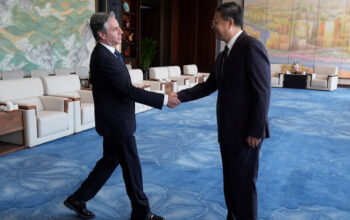
CAIRO — In one of the opening scenes, a Lebanese mother confronts her 17-year-old daughter after discovering two condoms in her purse. Minutes later, an Egyptian wife sneakily slips off her underwear just before leaving for dinner with her husband.
Fast-forward to the moment of peak tension (spoiler alert!): An Arab man, who is part of a group of close friends, is revealed to be gay.
These scenes from the Arabic-language remake of the Italian movie “Perfect Strangers” are rife with conflict. But the real drama exploded as soon as it was released on Netflix on Jan. 20, setting off a firestorm of criticism denouncing the film for flouting moral standards. But more moderate voices, including famous actors, writers and social media influencers, rushed to defend it.
“This film carries messages that serve as a trial balloon for ideas that are alien to us,” said Tamer Amin, a popular late-night host on Egyptian television. “If we let these thoughts and poisons spread, all morals will be lost.”
The polarizing reaction to the movie, the first Arabic film made by Netflix, reflected a culture war between the religious establishment and public across much of the Arab world and the often-youthful liberal forces that have converged on social media and are using technology and alternative channels to evade strict censorship, reach a wider audience and fuel change.
The movie revolves around seven Lebanese and Egyptian friends who gather for dinner and agree to openly share texts and calls that they receive that evening, exposing a cascade of secrets and affairs. Some messages revealed that one of the friends was gay, and the film humanizes the character by unraveling some of his friends’ homophobic reactions.
Conservatives across the region — especially in Egypt, which is home to the actress who starred in the “underwear scene,” as it came to be known — argued that the film diluted Arab and Muslim identities by projecting Western norms and a glossy, liberal lifestyle that are out of sync with the morals of a largely reserved and religious population.
Some critics went as far as to suggest that the film was the product of a foreign conspiracy that used social media and streaming sites to normalize teenage sex, promiscuity and homosexuality in an effort to undermine social cohesion and family values.
But defenders said the film invited honest conversation about universally relatable issues like sexual desire and infidelity — subjects that, in the Arab world, are largely taboo, often dismissed in public and barely addressed on state-regulated media.
“It’s as if these stories can only exist abroad,” said Lubna Qadoumi, 42, a Jordanian single working mother. She recalled how Netflix had also come under fire in Jordan a few years ago for a series about a group of Jordanian teenagers and their romantic entanglements.
“Some people just want to close their eyes and not look around them,” she said.
Tarek el-Shennawi, a prominent Egyptian film critic, attributed part of the outrage to panic over a changing landscape brought by foreign streaming services that routinely push boundaries and deal with themes like sex and sexuality.
“The fight is not about the film as much as it’s about morality and religion and what should and shouldn’t be,” he said.
With enough exposure, Mr. el-Shennawi added, people are bound to open up and accept diverse portrayals of the other.
“It’s a struggle, and you don’t know where the majority really stands,” he said. “But social change doesn’t happen overnight.”
In one possible indication of that change, in its first week on Netflix, “Perfect Strangers” leapfrogged to No. 1 in the United Arab Emirates, Egypt, Lebanon, Saudi Arabia, Qatar and Kuwait and to No. 5 on the site’s Top 10 non-English films list worldwide.
Mr. el-Shennawi recounted countless Arabic films — beloved classics from as far back as the 1950s — that embraced racy plotlines with fewer reservations.
One, “The Leech,” a 1956 Egyptian drama that was entered into the Cannes Film Festival, revolved around one woman’s relentless drive to seduce her lover. Actresses at the time dressed in miniskirts, kissed onscreen and accepted scripts that included sexual scenes and insinuations.
But since the 1980s and 1990s, a rise in religious conservatism pervaded state and civil institutions across much of the Arab world, and prompted the vast majority of Muslim women to cover their hair. This brought a new trend in moviemaking known as “clean cinema.”
One of the leading stars of the clean-cinema era was Mona Zaki, an Egyptian celebrity who rose to fame in the 1990s, often playing the part of the proper girl next door. She starred in the Arabic version of “Perfect Strangers” as the emotionally aggrieved wife who was caught in a loveless marriage and slipped off her underwear as she exchanged sexual texts with a man she met online.
Criticism of the jarring shift in Ms. Zaki’s choice of character fueled much of the anger over the film.
“The attack targeted Mona Zaki because Arab societies and institutions thought of her as the Arab woman who belonged to them,” said Reem Alrudaini, the head of the women and gender studies research unit at Kuwait University. “Now, it was like, no, she can’t represent our women.”
Ms. Alrudaini said that in a sense, Ms. Zaki’s evolution as an actress and the changing perceptions around her signaled a broader repudiation of the religious and conservative forces that had long dominated society and discouraged mainstream actors from accepting roles where a woman would be expressly sexual or where a man could be gay.
Five Movies to Watch This Winter
Days after the release of “Perfect Strangers” in Arabic, the Egyptian Actors’ Syndicate, a professional union, issued a strong statement saying it would support Ms. Zaki and all Egyptian artists against verbal assault, intimidation or retribution. It emphasized the organization’s role in protecting creative liberty and described the country as a “civil state,” signing off, “Long live an enlightened Egypt.”
Despite that endorsement, the war of words raged on, underscoring the delicate line that liberal artists are still forced to toe.
“As an artist, you’re always negotiating what you can and can’t say, and what you can and can’t get away with,” said Mohamed el-Hag, an Egyptian TV and film scriptwriter.
Featuring a sympathetic gay character may have crossed what conservatives — and many moderates — in the region consider a red line.
Homosexuality is strictly prohibited under Islam, is outlawed in some Arab countries and is a crime punishable by death in Saudi Arabia, Qatar and the United Arab Emirates. In several countries where it is not technically illegal, gay people can still be prosecuted under laws that criminalize “debauchery,” “indecency” or “immorality.”
In Egypt, undercover police investigators have a history of trolling online chat rooms and dating apps to entrap gay men, and in 2017, the authorities arrested activists for raising a rainbow flag at an indie-rock concert where the Lebanese lead singer was known to be openly gay.
Since the release of “Perfect Strangers,” its producers and cast members have remained silent out of fear that their appearance could stoke more opposition.
Last month, Al Azhar, Egypt’s central religious authority, warned people against work that aimed to “normalize homosexuality,” and it republished a formal religious opinion that deemed homosexuality a “reprehensible” sin.
“Netflix is promoting homosexuality,” said Mostafa Bakry, a member of Egypt’s Parliament, who filed for a formal call to action against the film. “I want the government to take the necessary measures to ban the kind of work that contradicts our customs and traditions.”
Mr. Bakry launched a similar action in 2006 after the release of an Egyptian film that also broached the subject of homosexuality. He gathered 122 signatures in support out of the more than 550 Parliament members.
This time, he managed to get only one besides his own.



